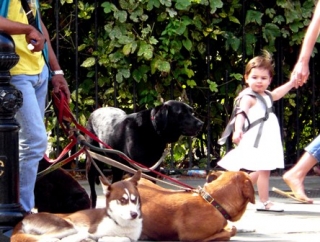Treating your dog like your kids? Let’s hope so!

It’s often the case that you hear a criticism levelled at some dog owners. The reason, it is stated, that their dogs do not behave is this: ‘The dog is their baby’. The owner can rather tragi-comically be portrayed cuddling the dog and buying it diamante accessories. Everybody shakes their heads in disbelief. This apparently leads to all sorts of unwanted behaviours in the dog. The dog is sometimes then punished – it is ‘spoilt’, ‘naughty’, ‘cosseted’. The list goes on. The statement is ‘This dog behaves like this because they treat it like a child’.
And yet, I always felt a certain unease with the comparison. I work with dogs and I work with children. Some of them – in both groups - are pretty tough to handle! In children, what we might call ‘challenging behaviours’ can be highly disruptive and interfere with group activities, or with their own learning.
Has that behaviour arisen because they were somebody’s ‘baby’? That it was treated ‘like a child’? Was it because they were cuddled or bought treats by their parents?
So here’s my view. I would hope that yes, most dogs are treated rather like some people’s children.
Some kids aren’t allowed to behave in a way that may disrupt others or cause harm. They are taught the social rules and learn to control their impulses to yell, race around, snatch things, fight, and all the other things you see children attempting. In parallel they are given life lessons in how to deal with frustration, what games are suitable, and how to be successful without confrontation. If there are sometimes things they would rather not do, they learn that at times they must comply, whether they like it or not. In return, their parents try to take the pressure off and let them just be themselves when there is not much call for ‘behaving’. Parents hope they will learn that successful outcomes do not always come from screaming and shouting.
It’s easier when they are little to do this of course – and ongoing, as they develop into adolescence, I’m sure these challenges grow. Altruism does not come easily to kids nor dogs for that matter. It’s just a method of survival that they need to learn in a society.
I feel that the best behaved dogs I know have the best behaved children in their family too. Rules don’t have to be harsh – in fact, I prefer ‘firm and fair’ – and experienced parents/dog handlers do get what they want without the heavy stuff we sometimes see on TV.
And you can still buy treats, cuddle them (if they enjoy that) and act kindly towards them.
So a dog, who clearly is not a human being, has to be viewed in their own way. They aren’t children. But they aren't toys, either. As we all know, some dogs don’t enjoy cuddling and other signs of affection that humans give out. And yet, to get good results, they must still be taught with the rules, common sense and fairness that I mention above.
Yes, they will get it wrong and yes, sometimes with all the sense and hard work in the world a dog or a child may end up in a pickle. Nevertheless, treating them ‘like kids’ just isn’t the issue.
Copyright Karen Wild www.karenwild.co.uk www.intellidogs.com
Photo: Roma Flowers (raflowers)




